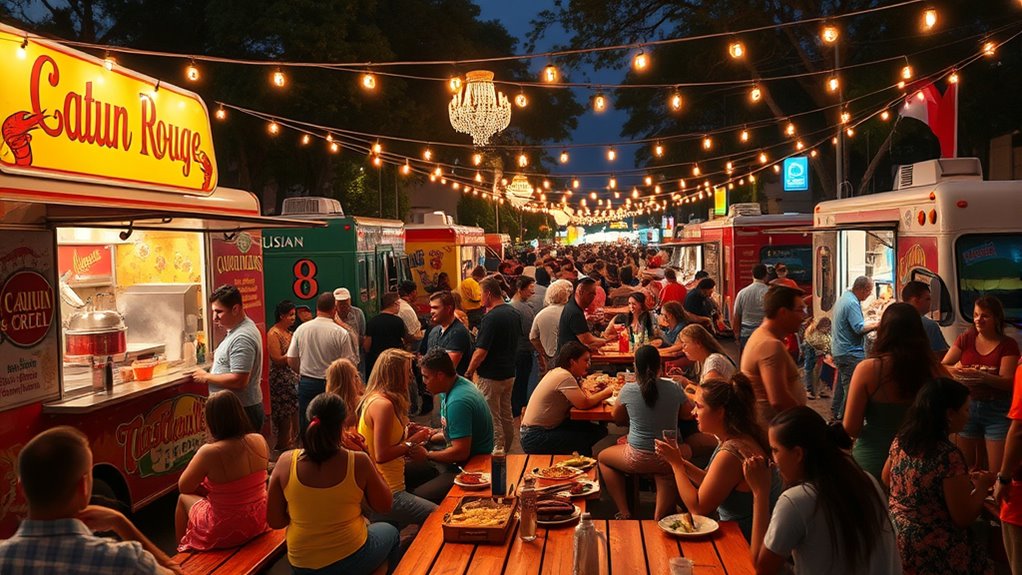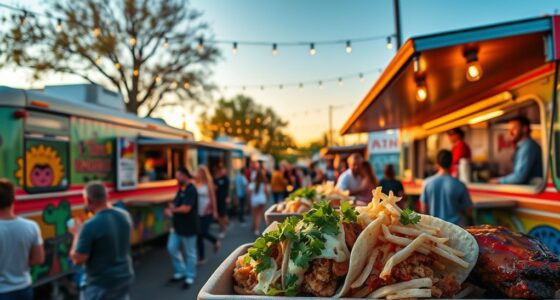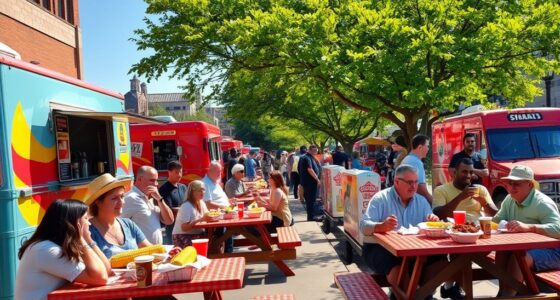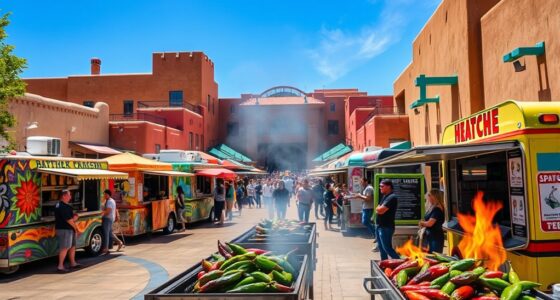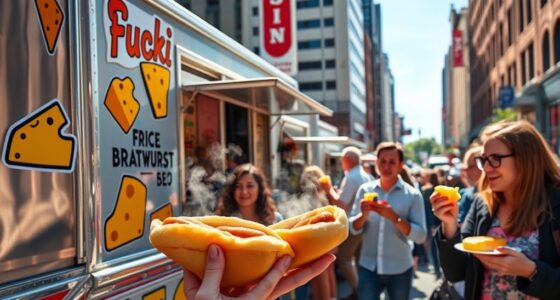In Baton Rouge, you can explore authentic Cajun and Creole flavors through vibrant food trucks that serve classic dishes like gumbo, jambalaya, and crawfish boils. Many trucks highlight the rich cultural heritage of Louisiana’s diverse influences, from French and African to Native American. Black-owned options showcase unique traditions and contribute to the community’s culinary scene. To discover some of the top trucks and signature dishes, keep exploring for more flavorful insights.
Key Takeaways
- Baton Rouge hosts diverse Cajun and Creole food trucks offering authentic dishes like gumbo, jambalaya, and po’boys.
- Many trucks emphasize traditional Louisiana cooking techniques, scratch-made recipes, and locally sourced ingredients.
- Black-owned trucks such as Louisiana Creole Creations highlight African American culinary influences.
- Food trucks serve as mobile ambassadors, promoting Louisiana’s rich culinary heritage to residents and tourists.
- They support community events, boost local economy, and celebrate Louisiana’s diverse cultural food traditions.
The Rich Heritage of Cajun & Creole Cuisine in Baton Rouge
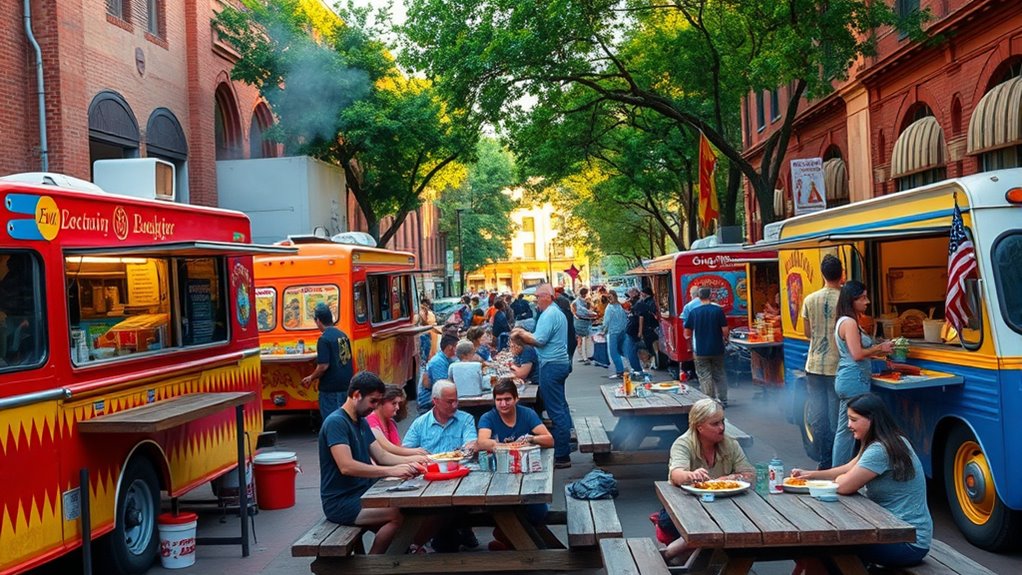
Have you ever wondered how Baton Rouge’s vibrant food scene reflects its rich cultural history? The roots of Cajun and Creole cuisine run deep here. Creole cooking started in New Orleans after 1704, influenced by French settlers, including young women from Paris who brought traditional French dishes. Native American tribes contributed ingredients like corn, beans, shellfish, and wild game, shaping both cuisines. Cajun food developed from Acadian French settlers in the bayous, relying on local ingredients like fish, wild game, and herbs, cooked in black iron pots. Spanish rule added spices, enriching Creole dishes, while African influences introduced okra, yams, and hot peppers. These diverse traditions blend, creating a culinary tapestry that’s as vibrant and complex as the city’s history. Additionally, private placement equity markets have supported the growth of local food entrepreneurs, helping preserve and innovate these traditional flavors.
Top Food Trucks Serving Authentic Louisiana Flavors
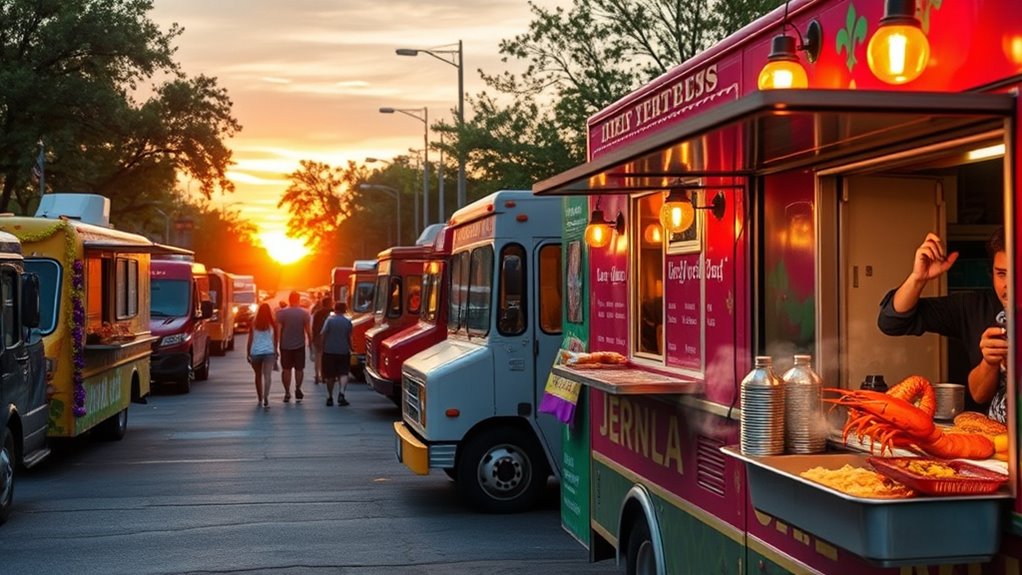
Baton Rouge’s vibrant street food scene is home to several top food trucks that serve authentic Louisiana flavors. These trucks bring Cajun and Creole dishes straight to your street food experience, offering mouthwatering classics and innovative takes. Kenny’s Cajun & Creole Cuisine on the Geaux is known for vibrant flavors, while Diva Dawg features Cajun-inspired street food with a twist. Copeland’s Mobile Kitchen delivers traditional Creole favorites, and Louisiana Creole Creations, LLC showcases authentic Creole and Cajun dishes, highlighting Black-owned business contributions. The Frying Station specializes in Cajun fried specialties that keep locals coming back. Here’s a quick look at these top trucks:
| Food Truck | Signature Dish | Special Feature |
|---|---|---|
| Kenny’s Cajun & Creole | Jambalaya, Gumbo | Authentic flavors |
| Diva Dawg | Cajun-inspired hot dogs | Innovative street food |
| Louisiana Creole Creations | Crawfish Po’ Boy, Boudin | Black-owned business |
Baton Rouge’s food trucks not only serve delicious dishes but also provide reliable catering options for events and gatherings, making it easy to enjoy Louisiana flavors anywhere. Additionally, these trucks often incorporate traditional cooking techniques to preserve the authentic taste of Louisiana cuisine.
Signature Dishes That Define Cajun & Creole Street Food
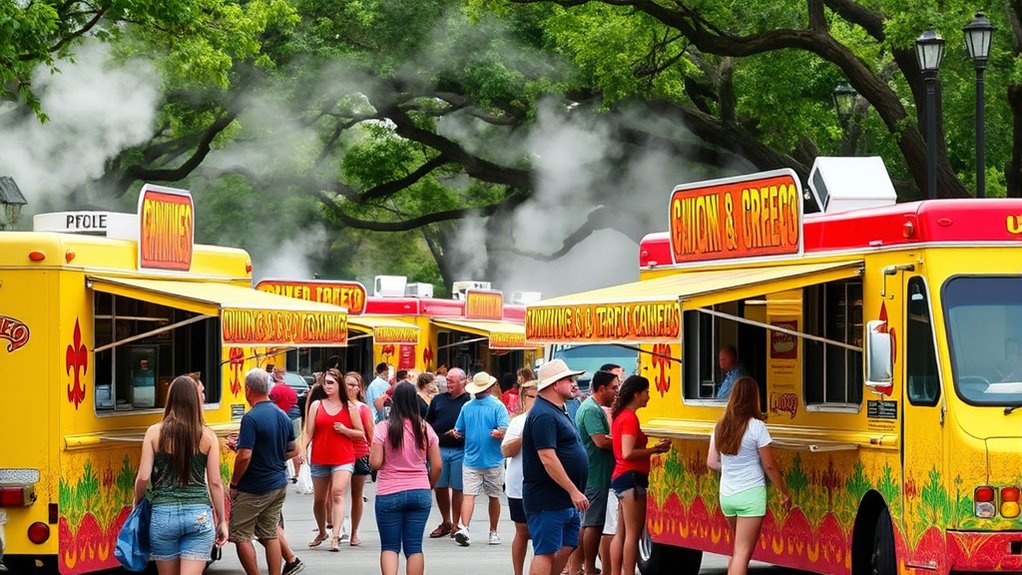
Signature dishes like gumbo, jambalaya, and po’boys serve as the heart of Cajun and Creole street food, showcasing the rich flavors and culinary traditions of Louisiana. Gumbo varies between Creole and Cajun styles, with Creole gumbo featuring tomatoes and Cajun gumbo relying on a roux without them. Jambalaya offers a one-pot rice dish, with Cajun versions being smoky and brown, while Creole jambalaya sports a tomato base and red hue. Étouffée, made with crawfish or shrimp in a thick roux sauce, delivers bold, spicy flavors. Po’boys, a classic Louisiana sandwich, highlight fried seafood or meats on French bread with flavorful dressings. Boudin balls, fried sausage bites, also define street food, emphasizing Louisiana’s love for hearty, flavorful bites. Exploring the local culinary heritage reveals how these signature dishes reflect Louisiana’s diverse cultural influences and historic food traditions.
The Cultural Impact of Cajun & Creole Food Trucks in the Community

Cajun and Creole food trucks do more than serve delicious dishes—they help preserve Louisiana’s culinary traditions and share them with the community. By bringing authentic recipes to diverse neighborhoods, they strengthen cultural identity and keep heritage alive. As you experience their offerings, you’re part of a movement that fosters community bonds through shared food and history. Food trucks also provide a flexible and accessible way for local chefs to showcase their culinary skills and innovative takes on classic Louisiana dishes. Incorporating branding and marketing strategies, these trucks build strong identities that resonate with their audiences and promote cultural pride.
Preserving Culinary Heritage
Food trucks play a vital role in preserving Louisiana’s rich culinary heritage by bringing traditional Cajun and Creole dishes directly to the community. They serve as mobile cultural ambassadors, keeping authentic recipes alive and accessible. Here are three ways they do this:
- They showcase regional specialties like maque choux and cuisses de grenouilles à la Provençale, ensuring these lesser-known dishes aren’t lost. They often source ingredients locally, which supports regional farmers and maintains the authenticity of the dishes.
- They educate locals and visitors on the differences between Cajun and Creole cuisine through authentic flavors and techniques. Color accuracy in their preparation ensures the true taste and visual appeal of these dishes are preserved.
- They preserve traditional cooking methods, such as roux preparation and spice blending, passing this knowledge through generations in a modern setting.
Fostering Community Connections
Community connections thrive when Cajun and Creole food trucks serve as vibrant social hubs in Baton Rouge. They make traditional dishes accessible and visible in everyday urban spaces, strengthening local pride. Events like the Food Truck Round Up attract over 1,200 diners, creating shared cultural experiences that unite diverse residents. These gatherings encourage casual interactions, breaking down social barriers and fostering inclusivity. Food trucks in public spaces promote outdoor communal participation and facilitate ongoing traditions. By supporting local entrepreneurs, they boost the economy and create opportunities for small businesses. Chefs often share stories about their dishes, enhancing cultural understanding. Food trucks are central to recurring community events, attracting large crowds and fostering social cohesion. Overall, Cajun and Creole food trucks build stronger social bonds, celebrate regional identity, and nurture a resilient, connected community.
How Food Trucks Celebrate Louisiana’s Culinary History

Food trucks in Baton Rouge keep Louisiana’s culinary history alive by serving authentic Cajun and Creole dishes made with traditional recipes and techniques. They celebrate cultural diversity by highlighting influences from African, Caribbean, and French communities, connecting food to the region’s rich heritage. The use of traditional cooking methods helps preserve these time-honored flavors and techniques. Through these efforts, trucks make Louisiana’s unique flavors accessible while honoring its culinary roots. Located in Baton Rouge, these mobile eateries also reflect the state’s vibrant food scene and its emphasis on down-home, Southern flavors.
Preserving Traditional Recipes
Preserving traditional recipes is at the heart of Baton Rouge’s vibrant food truck scene, where chefs meticulously recreate Louisiana’s beloved flavors. You’ll find classic dishes like Crawfish Étouffée, Seafood Gumbo, and Jambalaya made with authentic ingredients and time-honored techniques. 1. They use signature ingredients like Conecuh sausage, Camellia beans, and fresh seafood, staying true to Louisiana’s culinary roots. 2. Many trucks emphasize scratch-made dishes, sourcing local ingredients to maintain authentic preparation styles. 3. Traditional seasonings and methods, such as slow cooking and the use of okra and file powder, guarantee each bite reflects Louisiana’s rich culinary history. Additionally, catering services offered by many food trucks help keep these recipes alive during community events and celebrations. Incorporating cultural heritage into their menus, these trucks serve as mobile ambassadors of Louisiana’s rich culinary traditions.
Showcasing Cultural Diversity
Louisiana’s rich culinary history comes alive in Baton Rouge’s food trucks, which celebrate the region’s diverse cultural roots through authentic Cajun and Creole dishes. These trucks highlight Louisiana’s French, African, Spanish, and Native American influences with signature items like jambalaya, gumbo, étouffée, and po’boys. Black-owned trucks such as Louisiana Creole Creations emphasize African American contributions to Creole and Cajun cuisine. Serving as mobile ambassadors, they make regional specialties accessible beyond traditional restaurants and expand cultural reach. Many trucks participate in local festivals and community events, fostering social bonds and celebrating heritage. They also innovate by blending traditional flavors with modern twists, using seasonal ingredients to keep the cuisine relevant. This approach guarantees Louisiana’s culinary diversity remains vibrant and accessible to all. Louisiana’s culinary scene is also renowned for its emphasis on fresh, local ingredients, ensuring that each dish reflects the region’s commitment to sustainability and quality. Additionally, the use of regional ingredients enriches the authenticity and flavor profiles of these dishes, further preserving Louisiana’s culinary legacy.
Operational Insights and Booking Practices for Cajun & Creole Vendors
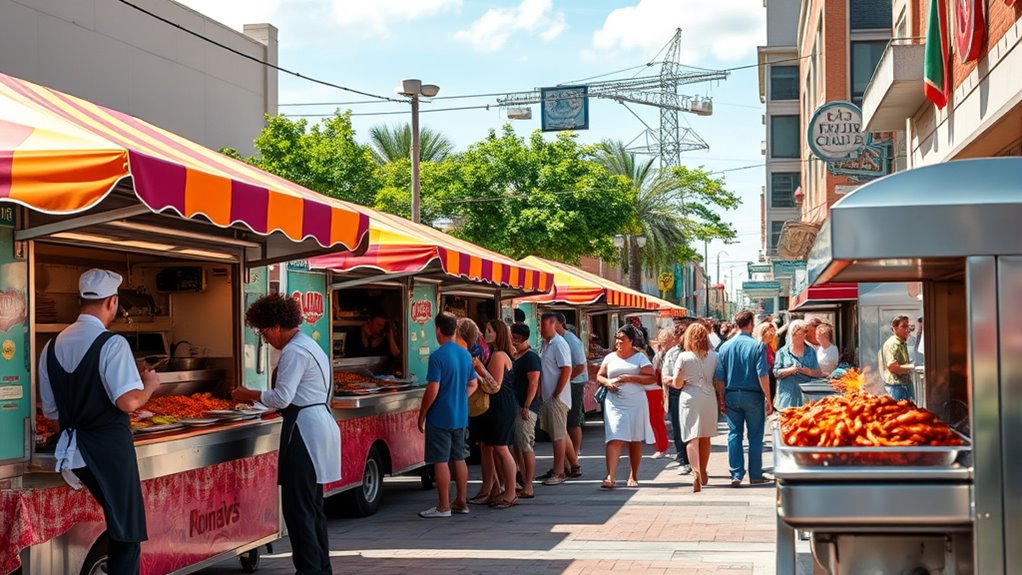
Operating a Cajun or Creole food truck in Baton Rouge requires careful planning and adherence to local regulations. You need to navigate permits, inspections, and safety standards to keep your operations compliant. When it comes to booking, advance planning is essential—most vendors require about 30 days’ notice for events. Here are some key practices:
Running a Cajun or Creole food truck in Baton Rouge demands compliance with local permits and safety regulations.
- Use online platforms and directories to streamline event bookings and manage logistics.
- Offer flexible menus tailored to different event sizes, from small parties to large festivals.
- Prioritize serving fresh, authentic dishes on-site, avoiding reheating to preserve flavor and quality. Online booking systems make scheduling and managing events more efficient, ensuring you can meet customer demands reliably. Additionally, understanding cookie preferences can enhance your website’s user experience and facilitate better communication with clients.
Enhancing Baton Rouge’s Food Scene and Tourism Through Street Food
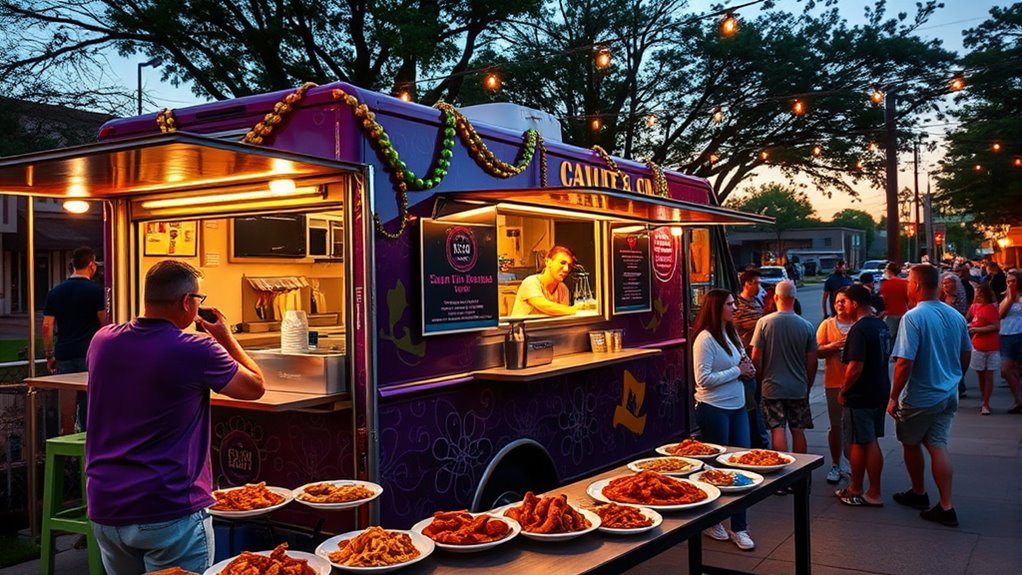
Street food in Baton Rouge is transforming the city’s culinary landscape by offering accessible, authentic experiences that attract both locals and visitors. Cajun and Creole food trucks showcase iconic dishes like gumbo, jambalaya, and crawfish boils, highlighting Louisiana’s rich culinary heritage. These trucks expand the city’s food scene, providing quick, affordable dining options that enhance tourist experiences and encourage longer stays. Their mobility allows them to serve high-traffic and culturally significant areas, making Louisiana’s flavors more visible and accessible. With the growing industry valued at over $3 billion nationwide, Baton Rouge’s food trucks also bolster local economic development by creating entrepreneurial opportunities. Additionally, the use of interactive and engaging marketing strategies helps attract a diverse array of customers. Overall, street food elevates Baton Rouge’s reputation as a vibrant, authentic culinary destination.
Supporting Diversity: Black-Owned Cajun & Creole Food Trucks in Baton Rouge

Black-owned Cajun and Creole food trucks play a essential role in enriching Baton Rouge’s culinary landscape by showcasing authentic flavors rooted in African American traditions. These trucks not only serve delicious, culturally significant dishes but also promote economic growth and community development. You’ll find standout businesses like Queen Eats and Royal Treats, which have been serving diverse Cajun foods since 2020, and Louisiana Creole Creations, LLC, offering classic Creole and Cajun cuisine with innovative twists. Supporting these trucks strengthens local economies, creates jobs, and fosters collaboration among black entrepreneurs. Additionally, their presence encourages culinary exploration, celebrates cultural heritage, and preserves Louisiana’s rich food traditions. Your patronage helps sustain these critical businesses and guarantees the ongoing vibrancy of Baton Rouge’s diverse food scene.
Black-owned Cajun and Creole trucks enrich Baton Rouge with authentic flavors, community growth, and cultural preservation.
- Boosts local economies through revenue circulation.
- Creates job opportunities for underserved communities.
- Promotes cultural storytelling through authentic cuisine.
Frequently Asked Questions
How Do Cajun & Creole Food Trucks Source Authentic Ingredients?
You’ll find Cajun and Creole food trucks sourcing authentic ingredients through strong local connections. They work directly with Louisiana farmers and fishermen to get fresh Gulf seafood, seasonal vegetables, and regional staples like rice and herbs. Specialty ingredients like filé powder and Cajun spice blends come from local markets and artisans. Despite seasonal challenges, they adapt by collaborating with distributors and supporting regional communities, ensuring every dish remains true to its cultural roots.
What Are the Most Popular Times to Find Cajun & Creole Trucks in Baton Rouge?
Imagine catching the vibrant flavors of Baton Rouge when the city comes alive. You’ll find Cajun and Creole trucks bustling most on weekdays from around noon to 2 PM, perfect for a quick, flavorful lunch. Saturday’s the day for full-service, with trucks operating all day. Evenings, especially during food truck gatherings, draw crowds between 6 and 8 PM, offering a lively, tasty experience.
Can I Customize Cajun & Creole Dishes at These Food Trucks?
You can customize Cajun and Creole dishes at food trucks, but options are limited. Most trucks offer set menus with some flexibility, like adjusting spice levels or adding extra proteins. However, extensive modifications are often restricted due to space, ingredients, and preparation methods. To improve your chances, request customizations in advance, visit during off-peak hours, and choose trucks known for personalized service. Respect their limitations for a better experience.
Are Cajun & Creole Trucks Suitable for Large Event Catering?
You might think large events mean bland, generic catering, but Cajun and Creole food trucks prove otherwise. They’re highly suitable, offering authentic, flavorful dishes like gumbo and jambalaya that impress crowds and preserve regional culture. With scalable capacity, quick service, and reliable quality, these trucks turn any large gathering into a vibrant celebration of Louisiana’s rich culinary heritage. Your guests will savor every bite, creating memorable moments with genuine cuisine.
How Do Food Trucks Maintain Traditional Flavors in a Mobile Setting?
You can uphold traditional flavors in a mobile setting by sourcing fresh, local ingredients and preparing complex components in advance. Use specialized equipment like cast iron skillets and controlled heat to replicate classic cooking techniques. Stick to authentic recipes, measuring spices carefully, and taste-test regularly to adjust seasonings. Efficient batch cooking during off-hours helps preserve flavor integrity, while consistent training ensures your team delivers the true taste of Cajun and Creole dishes on the go.
Conclusion
As you explore Baton Rouge’s vibrant street food scene, you’re tasting more than just flavors—you’re savoring a rich tapestry of history and culture that dances on your palate. These Cajun and Creole food trucks are the heartbeat of Louisiana’s culinary soul, serving up stories with every bite. So, let yourself be swept away by the spices, the melodies, and the community spirit that make this city’s food scene unforgettable.
